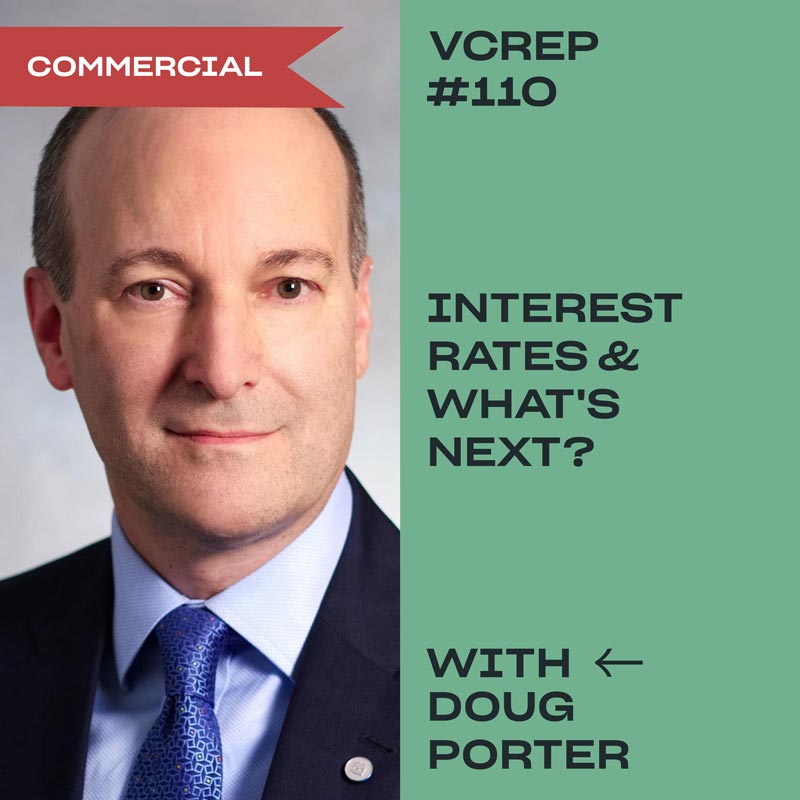
Powered by RedCircle
Back by popular demand, Cory and Matt welcome Douglas Porter, Chief Economist and Managing Director of Economics at BMO Financial Group.
Doug provides unparalleled insights into the current landscape of interest rates and offers a crystal-clear view of what lies ahead. Will the trend continue its upward trajectory or are we on the brink of a shift?
Delving into the heart of economic forecasts, Doug addresses the pressing question on every investor's mind: what's next? Gain valuable perspectives on potential scenarios from inflation to monetary policy shifts.
For anyone looking to navigate the financial landscape with confidence, this episode is a must-listen. Stay informed, straight from the experts.
We sit down with BMO Chief Economist Doug Porter to find out how the Canadian economy is really doing and why the Canadian housing market has blown every forecast out of the water. How have interest rates impacted the economy and the Canadian housing market? What’s next for the Bank of Canada? And are we still heading towards a recession?
Who is Doug Porter?
I’ve been an economist for my entire career, starting at the Bank of Canada in the early 1980’s. I have spent most of my time at the Bank of Montreal here in Toronto. I manage a team of about 16, some of whom work in San Francisco. I like to say we’re the best economic shop in Canada!
What’s going on with the Canadian economy?
The economic story for 2023 is how resilient the Canadian economy has been. A year ago, everyone thought Canada, and North America more broadly, would be going through a recession. It’s not the strongest the market has ever been but it’s certainly held up better than expected.
Because of that resilience, we find ourselves dealing with higher interest rates. The Federal Reserve and the Bank of Canada have made no promises about lowering rates. Long term interest rate bond yields are just grinding higher; we’re at rates we haven’t seen since 2007.
What accounts for the resilience in the Canadian economy and in North America more generally?
The overall story is the consumer. Both in Canada and the US, we’re sitting on a lot of savings. There’s also a lot of pent up demand for travel and entertainment. We knew that coming into 2023 but we weren’t sure how it would stack up against interest rates.
Another piece of the puzzle is the labour market. The labour market is still very strong, though we have seen some softening around the edges. We’ve been adding a lot of jobs in both economies.
Did we nail the soft landing or will Canada still head into a recession?
I think a recession could still be in the cards. There are a lot of new risks out there for the economy. But so far, it’s looking like a soft landing.
The reality is that we keep moving forward as an economy. There’s no guarantee that what has been a soft landing so far will remain so.
There’s a difference between Canada and the US that comes back to the vulnerability of the household sector. We have more household debt in Canada than they do in the US and our debt turns over a lot faster. Many Americans have 30 year mortgages which we don’t have here.
A run up in interest rates will affect the Canadian consumer more quickly and more harshly than it will our American counterparts.
We don’t officially have a recession in our forecast for Canada. We’re predicting a one year period where the economy struggles, but not to the point of a recession. But in our US prediction, we don’t see a single quarter of negative GDP. We don’t see strong growth for the US, but we do see more struggle in Canada.
What happens next with interest rates?
It comes back to inflation. We got as low as 2.8% inflation back in June but unfortunately, largely due to gas prices, we’re back to 4% inflation. Even underlying inflation is starting to pick up. The Bank of Canada just isn’t comfortable with that.
Whether they raise rates again or not, it looks like the Bank of Canada is going to have to keep interest rates high for some time.
We don’t predict the Bank of Canada will cut interest rates until the second half of 2024, and even then it will be slow steps down the staircase, not a slash.
The big question is: Where do rates ultimately settle after this inflation episode? I don’t think we’re going back to pre-pandemic rates. That time was an outlier and rates were unnaturally low.
The Bank of Canada’s overnight interest rate is currently 5%. Two years from now, we expect it will be about 2.5-3%. So that’s lower than today but not down to the extreme lows we saw the decade before the pandemic.
Has the Canadian real estate market been more resilient than economists thought it would be?
Yes, the Canadian housing market has been more resilient than we thought. Home prices did correct by a little more than 15% between 2022 and 2023 – which is a very serious correction – but less than anyone expected given the interest rate hikes. We were expecting a 25% decline in house prices!
Of course, there were big variations regionally. Some cities saw much more severe corrections and some saw less. BC did better than average. Vancouver and Victoria both held up better. Ontario had the biggest boom during the pandemic and it’s had the biggest hangover since.
The real estate industry has to be careful what they wish for. The Bank of Canada is watching the housing market very closely. If the market gets too healthy, that increases the risk that the bank will raise rates again.
Have we seen the bottom of the housing market?
I’m not 100% confident answering this question but I do believe we have seen the bottom. I don’t think the Bank of Canada will have to raise rates further from here and if they do, it would only be by another quarter. I think we’ve seen most of the bad news on rates already.
I’m very impressed with how the real estate market has dealt with the rising rates. I expect we’ll see sideways growth in the national market over the next 6-12 months. A number of metrics suggest the market is quite balanced now between buyers and sellers.
So my best guess is we are past the worst but I wouldn’t expect a big turn up.
Is the Canadian housing market at risk? Will the Canadian housing bubble burst?
I’ve been hearing about the Canadian housing bubble for a very long time. I think there is some risk in the housing market, especially if the Bank of Canada starts moving more quickly. But there are good reasons why home prices are so high in this country.
One thing the Canadian housing market has going for it is strong population growth. Interest rates will dominate in the short term but in the medium and long term, it’s all about demographics. That’s a powerful support for the housing market.
What would drive interest rates higher than they are right now? What’s the worst case scenario?
I would say there’s a 15-20% chance that the Bank of Canada has to slam on the breaks. That would likely be a global issue with other central banks also needing to take harsher action.
If we have another spike in oil or food prices, that could trigger another wave of inflation. If the North American economy remains robust and we see wage increases, that could feed on itself. Those are things I would get concerned about if the central bank loses patience.
Almost everyone thinks that interest rates will come down in 2024, to varying degrees. But everyone also said that a year ago and here we are. So never say never!
Is it getting easier to forecast?
I think it’s getting easier. 2020/2021 were incredibly tough to forecast – we were basically trying to forecast where covid was going and how governments would react. It was a situation none of us had seen before. We didn’t even know if we could trust the economic data being produced.
We’re back in a more conventional world. It’s still different from what we’ve dealt with in the last 30-40 years but it’s not completely unfamiliar. It’s harder to forecast now than it was before covid, but easier than during 2020 and 2021.
Is there one data point that isn’t being talked about enough?
One indicator that even economists didn’t use to pay attention to is the monthly job vacancy numbers. They give you a pretty good sense of how tight the job market is. The job vacancy numbers peaked in late 2021/early 2022 in both Canada and the US. The numbers have come down since but there are still more vacancies now than before the pandemic.
Broadly, the monthly job numbers with the unemployment rate and the CPI report are the most important numbers to watch.
What will the headline be for the rest of 2023 and into 2024?
What keeps me awake at night isn’t economic factors, it’s geo-political risks. A lot of countries are going to have elections in 2024. I think next year will be dominated by the US election. It might make the Fed a bit shy about raising rates farther; they don’t want to be part of the political conversation.
Hopefully, the story is that inflation has come down and we’re looking at some interest rate relief by the end of 2024.
For all the curious minds interested in commercial real estate investing, grab a coffee and pull up a chair because we have exclusive stories and tips from commercial real estate brokers, investors, developers, economists, urban planners, and everyone in-between. From the successes and failures to the motivations and lessons learned, the Vancouver Commercial Real Estate Podcast is your insight into commercial real estate in Vancouver, Victoria, Kelowna, and beyond.
What's the best real estate market to invest in? What are the commercial real estate asset classes and property types? Hosted by Cory Wright, founder of William Wright Commercial, and co-hosts Adam and Matt Scalena of the Vancouver Real Estate Podcast, our podcast opens the door to real estate investing for everyone from beginner investors to experienced real estate professionals. New episodes are released every Tuesday. Follow the Vancouver Commercial Real Estate Podcast on Apple Podcasts, Spotify, Google Podcasts, or your favourite streaming platforms.

This communication is not intended to cause or induce breach of an existing agency agreement. E&OE: All information contained herein is from sources deemed reliable, and have no reason to doubt its accuracy; however, no guarantee or responsibility is assumed thereof, and it shall not form any part of future contracts. Properties are submitted subject to errors and omissions and all information should be carefully verified. All measurements quoted herein are approximate.
ⓒ William Wright Commercial Real Estate Services 2024
Proudly designed by Burst Creative